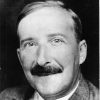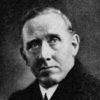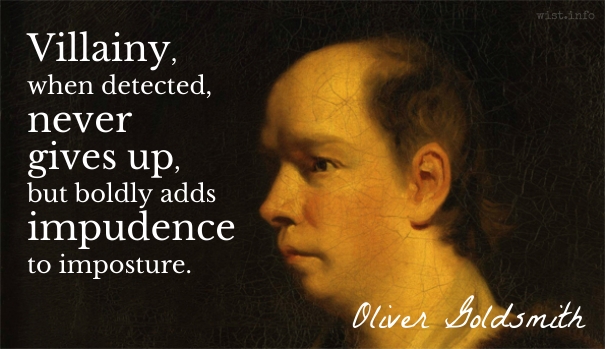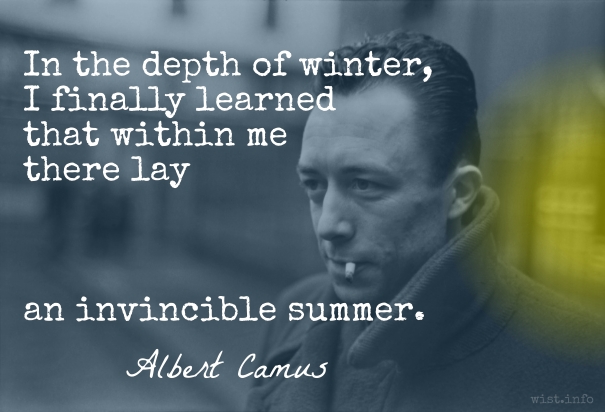Come, let us live and love, my dear,
A fig for all the pratings drear
Of sour old sages, worldly wise.
Aye, suns may set again to rise;
But as for us, when once our sun
His little course of light has run,
An endless night we’ll sleep away.
[Vivamus, mea Lesbia, atque amemus
rumoresque senum severiorum
omnes unius aestimemus assis
soles occidere et redire possunt:
nobis cum semel occidit brevis lux,
nox est perpetua una dormienda.]Catullus (c. 84 BC – c. 54 BC) Latin poet [Gaius Valerius Catullus]
Carmina # 5 “To Lesbia,” ll. 1-6 [tr. Stewart (1915)]
(Source)
One of Catulllus' most popular and widely-translated poems.
(Source (Latin)). Alternate translations:
Come and let us live, my Deare,
Let us love and never feare
What the sourest Fathers say:
Brightest Sol that dyes to-day
Lives againe as blithe to-morrow;
But if we darke sons of sorrow
Set, ô then, how long a Night
Shuts the Eyes of our short light!
[tr. Crashaw (1648)]
Lesbia, live to love and pleasure,
Careless what the grave may say:
When each moment is a treasure
Why should lovers lose a day?
Setting suns shall rise in glory,
But when little life is o'er,
There's an end of all the story --
We shall sleep, and wake no more.
[tr. Langhorne (c. 1765)]
Let's live, and love, my darling fair!
And not a single farthing care
For age's babbling spite;
Yon suns that set again shall rise,
but, when our transient meteor dies,
We sleep in endless night.
[tr. Nott (1795)]
My Lesbia, let us love and live,
And to the winds, my Lesbia, give
Each cold restraint, each boding fear
Of age and all her saws severe.
Yon sun now posting to the main
Will set -- but 'tis to rise again: --
But we, when once our mortal light
Is set, must sleep in endless night!
[tr. Coleridge (1798)]
Love, my Lesbia, while we live,
Value all the cross advice
That the surly greybeards give
At a single farthing's price.
Suns that set again may rise;
We, when once our fleeting light,
Once our day in darkness dies,
Sleep in one eternal night.
[tr. Lamb (1821)]
Live we, love we, Lesbia dear,
And the stupid saws austere,
Which your sour old dotards prate,
Let us at a farthing rate!
When the sun sets, ' tis to rise
Brighter in the morning skies;
But, when sets our little light,
We must sleep in endless night.
[tr. T. Martin (1861)]
The while we live, to love let's give
Each hour, my winsome dearie!
Hence, churlish rage of icy age!
Of love we 'll ne'er grow weary.
Bright Phoebus dies, again to rise;
Returns life's brief light never;
When once 'tis gone, we slumber on
For ever and for ever.
[tr. Cranstoun (1867)]
Living, Lesbia, we should e'en be loving.
Sour severity, tongue of eld maligning,
All be to us a penny's estimation.
Suns set only to rise again to-morrow.
We, when sets in a little hour the brief light,
Sleep one infinite age, a night for ever.
[tr. Ellis (1871)]
Love we (my Lesbia!) and live we our day,
While all stern sayings crabbed sages say,
At one doit's value let us price and prize!
The Suns can westward sink again to rise
But we, extinguished once our tiny light,
Perforce shall slumber through one lasting night!
[tr. Burton (1893)]
Let us live, my Lesbia, and let us love, and count all the rumors of stern old men at a penny's fee. Suns can set and rise again: we when once our brief light has set must sleep through a perpetual night.
[tr. Smithers (1894)]
Come, my Lesbia, no repining;
Let us love while yet we may!
Suns go on forever shining;
But when we have had our day,
Sleep perpetual shall o'ertake us,
And no morrow's dawn awake us.
[tr. Field (1896)]
Let us live, my Lesbia, and love, and value at one farthing all the talk of crabbed old men.
Suns may set and rise again. For us, when the short light has once set, remains to be slept the sleep of one unbroken night.
[tr. Warre Cornish (1904)]
Let us live, my Lesbia, let us love, for the reprobation of soured age let us not care a sou. Suns can set and rise again; but to our brief light, when once it sets, there comes a never-ending night that must be passed in never-ending sleep.
[tr. Stuttaford (1912)]
We live, Lesbia,
And we love, Lesbia,
And what do we care what the world may say?
The sun goes down,
And the sun comes up,
But our little lives pass away
In a day,
Our poor little lives pass away.
[tr. Dement (1915)]
Let us revel in life and love, my darling;
All that crabbed antiquities say idly
We will value together at a farthing.
Suns may set , and return again as brightly:
When our light to its dying spark has fluttered,
We must sleep an eternity of slumber.
[tr. Symons-Jeune (1923)]
O! let us love and have our day,
All that the bitter greybeards say
Appraising at a single mite.
My Lesbia , suns can set and rise:
For us the brief light dawns and dies
Once only, and the rest is night.
[tr. MacNaghten (1925)]
Come let us live and let us love,
And the stern voice of censors prove,
Who bid us from our loving cease,
Exactly worth a penny piece.
For suns can rise and suns can wane
And on the morrow rise again;
But when our one brief day is gone,
For ever we must sleep alone.
[tr. Wright (1926)]
Come, Lesbia, let us live and love,
nor give a damn what sour old men say.
The sun that sets may rise again
but when our light has sunk into the earth,
it is gone forever.
[tr. Gregory (1931)]
Lesbia, let us live only for loving,
and let us value at a single penny
all the loose flap of senile busybodies!
Suns when they set are capable of rising,
but at the setting of our on brief light
night is one sleep from which we never awaken.
[tr. C. Martin (1979)]
Let us live, my Lesbia, let us love,
and all the words of the old, and so moral,
may they be worth less than nothing to us!
Suns may set, and suns may rise again:
but when our brief light has set,
night is one long everlasting sleep.
[tr. Kline (2001)]
Let us live, my Lesbia, and let us love,
and let us judge all the rumors of the old men
to be worth just one penny!
The suns are able to fall and rise:
When that brief light has fallen for us,
we must sleep a never ending night.
[tr. Negenborn (1997)]
Let's live, Lesbia mine, and love --
and as for scandal, all the gossip, old men's strictures,
value the lot at no more than a farthing!
Suns can rise and set ad infinitum --
for us, though, once our bref life's quenched,
there's only one unending night that's left to sleep through.
[tr. Green (2005)]
Come live with me, Lesbia, and be my love,
And ignore the wagging tongues
Of wilted crones and toothless geezers.
Suns rise and set, rise and set again,
But we, when our brief light is blacked,
Must sleep forever, and then forever.
[tr. Hager (2006)]
My Lesbia, let’s live and let’s love,
Let all the rumors of harsh old men
count for only a penny.
Suns can set and rise again:
but when our brief light sets
we must sleep a lonely endless night.
[tr. @sentantiq (2015)]
Let us live, my Lesbia, and let us love,
and let's value all the rumors
of rather stern old men as one penny!
Suns can set and return;
as for us, once our brief light sets,
there is one perpetual night to be slept.
[tr. Wikibooks (2017)]
Let us live, my Lesbia, and let us love,
and let us value all the rumors of
more severe old men at only a penny!
Suns are able to set and return:
when once the short light has set for us
one perpetual night must be slept by us.
[tr. Wikisource (2018)]
Compare also these two pieces, which start modeled after Catullus (as shown):
My sweetest Lesbia, let us live and love;
And though the sager sort our deeds reprove,
Let us not weigh them: Heaven's great lamps do dive
Into their west, and straight again revive,
But, soon as once set is our little light,
Then must we sleep one ever-during night.
[Thomas Campion, A Book of Airs (1601)]
Come my Celia, let us prove,
While we can, the sports of love;
Time will not be ours forever,
He at length our good will sever.
Spend not then his gifts in vain;
Suns that set may rise again,
But if once we lose this light,
'Tis with us perpetual night.
[Ben Jonson, Volpone, Act 3, sc. 6 (1616)]
Quotations about:
defiance
Note not all quotations have been tagged, so Search may find additional quotes on this topic.
So up I got in anger,
And took a book I had,
And put a ribbon on my hair
To please a passing lad.
And, “One thing there’s no getting by —
I’ve been a wicked girl.” said I;
“But if I can’t be sorry, why,
I might as well be glad!”Edna St. Vincent Millay (1892-1950) American poet
“The Penitent”, st. 3, A Few Figs from Thistles (1921)
(Source)
And Man in portions can foresee
His own funereal destiny;
His wretchedness, and his resistance,
And his sad unallied existence:
To which his Spirit may oppose
Itself — and equal to all woes,
And a firm will, and a deep sense,
Which even in torture can decry
Its own concenter’d recompense,
Triumphant where it dares defy,
And making Death a Victory.
You have to laugh at the things that hurt you just to keep yourself in balance, just to keep the world from running you plumb crazy.
Ken Kesey (1935-2001) American novelist, essayist, countercultural figure
One Flew Over the Cuckoo’s Nest, Part 3 (1962)
(Source)
This said, the thief lifted his hands on high,
Making the figs with both his thumbs, and shrieking:
“The fico for Thee, God! take that, say I!”
At once I liked the snakes; for one came sneaking
About his throat, and wreathed itself around
As though to say: “I will not have thee speaking.”[Al fine de le sue parole il ladro
le mani alzò con amendue le fiche,
gridando: “Togli, Dio, ch’a te le squadro!”.
Da indi in qua mi fuor le serpi amiche,
perch’una li s’avvolse allora al collo,
come dicesse ’Non vo’ che più diche’.]Dante Alighieri (1265-1321) Italian poet
The Divine Comedy [Divina Commedia], Book 1 “Inferno,” Canto 25, l. 1ff (25.1-6) (1320) [tr. Sayers (1949)]
(Source)
In Circle 8, the 7th Bolgia, where thieves are tormented by snakes. After chatting with Dante, one of the damned souls makes obscene gestures toward God.
The "fig" is generally thought to be poking the thumb between the index and middle finger, a gesture still found around the Mediterranean and Latin America, and carries the same sentiment as flipping someone off. The precise gesture is debated (with relish) by Dante scholars, all of whom agree at the very least that it is a naughty one.
(Source (Italian)). Alternate translations:
When thus the Thief had spoken, he his hands
Lifted aloft with mocking signs, and cried;
"See these, O God, for pointed they're to you."
The Serpents now were to me friends become;
For one entiwn'd himself about this neck,
As if he'd say, You shall not more blaspheme.
[tr. Rogers (1782)]
Sternly he ceas'd, with execrations dire;
And, loud blaspheming Heav'n's Eternal Sire,
He rais'd his ruffian hands, and dare his wrath!
But soon a spiny snake his members binds,
Another round his vocal passage winds,
And stops with many a fold the felon's breath.
[tr. Boyd (1802), st. 1]
When he had spoke, the sinner rais’d his hands
Pointed in mockery, and cried: “Take them, God!
I level them at thee!” From that day forth
The serpents were my friends; for round his neck
One of then rolling twisted, as it said,
“Be silent, tongue!”
[tr. Cary (1814)]
The plunderer ceased, and twisting both his thumbs
Between the fingers, tossed his hands on high,
Crying, "Take mine homage, God, to thee it comes!"
Thenceforth befriended me the serpent fry.
For one around his neck that moment twined.
As it had said, "None other word will I
From him."
[tr. Dayman (1843)]
At the conclusion of his words, the thief raised up his hands with both the figs, shouting: "Take them, God, for at thee I aim them!"
From this time forth, the serpents were my friends; for one of them then coiled itself about his neck, as if saying: "Thou shalt speak no farther!"
[tr. Carlyle (1849)]
And when his words were ended, there the thief
Upraises his hands in mockery on high --
"Take them, O God! I level them at thee."
Henceforth the serpent race and I were friends;
One, at the point, his neck entwining o'er,
As if -- "I do not wish thee to say more."
[tr. Bannerman (1850)]
He spoke, and when he ended then the thief
His hands uplifted, and with sign obscene,
Exclaim'd -- "Thus I defy thee, oh, thou God!"
Henceforth as friends I held that serpent brood,
For one of them coil'd instant round his neck,
As if he would have said -- "Speak thou no more!"
[tr. Johnston (1867)]
At the conclusion of his words, the thief
Lifted his hands aloft with both the figs,
Crying: "Take that, God, for at thee I aim them."
From that time forth the serpents were my friends;
For one entwined itself about his neck
As if it said: "I will not thou speak more"
[tr. Longfellow (1867)]
At the end of his speech the robber raised his hands with both their figs, crying, 'Take them, God, for at thee I show them.' From that time to this have the serpents been my friends, seeing that one wound itself then about his neck, as though it said: 'I will not that thou say more.'
[tr. Butler (1885)]
When he had closed his speech the robber there
Raised his clenched fingers with the thumb thrust through,
Shouting: "God take him, him to thee I bare."
Then did the serpents prove my guardians true,
For one entwined himself around his neck.
As though it said. Thou shalt not speak anew.
[tr. Minchin (1885)]
At the end of his words the thief raised his hands with both the figs, crying, “Take that, God! for at thee I square them.” Thenceforth the serpents were my friends, for then one coiled around his neck, as if it said, “I will not that thou say more.”
[tr. Norton (1892)]
His words came to an end, the thief held both his hands aloft with scornful gesture, the while he cried aloud: " Take it, God, for it is at Thee I aim it."
From thenceforth were the snakes my friends, for at that moment one of them entwined himself about his neck, as if to say," 'Tis not my will that thou shouldst utter more."
[tr. Sullivan (1893)]
When he had made an end of words, the robber
Upraised his hands with both the figs of insult,
Crying out: "Take it, God, at thee I square them."
Serpents have been endeared to me thenceforward;
For on his neck one coiled itself that moment,
As who should say: "I let thee not speak further."
[tr. Griffith (1908)]
At the end of his words the thief lifted up his hands with both the figs, crying, "Take that, God, for at Thee I square them!" From that time forth the serpents were my friends, for one coiled itself then about his neck, as if to say: I will not have thee say more."
[tr. Sinclair (1939)]
When he had made an end, the thief exclaimed,
Raising his hands with both the figs on high:
"Take thou them, God; at thee, at thee they are aimed."
Thenceforth the serpents were no enemy
To me; for round his neck, as if it hissed
Thou speak'st no more! one coiled and clung thereby.
[tr. Binyon (1943)]
When he had finished, the thief -- to his disgrace --
raised his hands with both fists making figs,
and cried: "Here, God! I throw them in your face!"
Thereat the snakes became my friends, for one
coiled itself about the wretch's neck
as if it were saying: "You shall not go on!"
[tr. Ciardi (1954)]
At the end of his words the thief raised up his hands with both the figs, crying, “Take them, God, for I aim them at you!” From this time forth the serpents were my friends, for one then coiled itself about his neck, as if it said, “You shall say no more.”
[tr. Singleton (1970)]
When he had finished saying this, the thief
shaped his fists into figs and raised them high
and cried: "Here, God, I've shaped them just for you!"
From then on all those snakes became my friends,
for one of them at once coiled round his neck
as if to say, "That's all you're going to say."
[tr. Musa (1971)]
When he had finished with his words, the thief
raised high his fists with both figs cocked and cried:
“Take that, o God; I square them off for you!”
From that time on, those serpents were my friends,
for one of them coiled then around his neck,
as if to say, “I'll have you speak no more."
[tr. Mandelbaum (1980)]
When he had finished speaking the thief
Raised both his hands, making obscene gestures,
And called out: ‘There you are God, so much for you!’
From that moment the serpents were my friends,
Because one of them wound about his neck
As if to say: ‘I want you to say no more.'
[tr. Sisson (1981)]
The thief held up his hands when he was through,
And "God," he cried, making the fig with both --
"Take these: I aim them squarely up at you!"
The serpents were my friends from that time forth.
For then one coiled itself about his neck
As if to say, "That's all then, from your mouth."
[tr. Pinsky (1994)]
At the end of his words the thief raised his hands with both the figs, crying: “Take them, God, I’m aiming at you!”
From then on snakes have been my friends, because one of them wrapped itself around his neck, as if to say “I won’t let him say more.”
[tr. Durling (1996)]
At the end of his speech, the thief raised his hands, both making the fig, the obscene gesture, with thumb between fingers, shouting: ‘Take this, God, I aim it at you.’ From that moment the snakes were my friends, since one of them coiled itself round his neck, as if hissing: ‘You will not be able to speak again.’
[tr. Kline (2002)]
His words now reached their end. And then the robber
hoisted hands on high -- a fig-fuck formed in each --
and screamed: "Take that! I'm aiming, God, at you!"
From that point on, the serpents were my friends.
For one entwined its length around his neck
as if to say: "I'd have him speak no more."
[tr. Kirkpatrick (2006)]
Then, making the figs with both his thumbs,
the thief raised up his fists and cried:
'Take that, God! It's aimed at you!'
From that time on the serpents were my friends,
for one of them coiled itself around his neck
as if to say, 'Now you shall speak no more.'
[tr. Hollander/Hollander (2007)]
His words thrown down, the thief held up his hands,
Making an obscene gesture with both his thumbs
And crying: "For you, O God, I aim this at you!"
And then I began to like the snakes, for one
Of them was quickly coiling around his neck,
As if saying" "You've talked as much as you're allowed to."
[tr. Raffel (2010)]
The thief raised both his hands when he said this,
Two fingers up from each, the figs: and cried
“You get it, God? You know what you can kiss?”
From then on, all the snakes were on my side,
For one looped round his neck, as if to say
“You've said enough.”
[tr. James (2013)]
I praise Thee while my days go on;
I love Thee while my days go on!
Through dark and dearth, through fire and frost,
With emptied arms and treasure lost,
I thank Thee while my days go on.
Death is an endless night so awful to contemplate that it can make us love life and value it with such passion that it may be the ultimate cause of all joy and all art.
Paul Theroux (b. 1941) American novelist and travel writer
“D is for Death,” Hockney’s Alphabet (1991) [ed. Stephen Spender]
(Source)
Tears are sometimes an inappropriate response to death. When a life has been lived completely honestly, completely successfully, or just completely, the correct response to death’s perfect punctuation mark is a smile.
If you stay alive for no other reason at all, please do it for spite.
Maria Bamford (b. 1970) American actress and stand-up comedian
“The Special Special Special!” (2012)
(Source)
Only ambition is fired by the coincidences of success and easy accomplishment but nothing is quite as splendidly uplifting to the heart as the defeat of a human being who battles against the invincible superiority of fate. This is always the most grandiose of all tragedies, one sometimes created by a dramatist but created thousands of times by life.
If fate means you to lose, give him a good fight anyhow.
The first fact about the celebration of a birthday is that it is a way of affirming defiantly, and even flamboyantly, that it is a good thing to be alive.
Gilbert Keith Chesterton (1874-1936) English journalist and writer
“Our Birthday,” G. K.’s Weekly (1935-03-21)
(Source)
And what is an authentic lunatic? He is a man who has preferred to become what is socially understood as mad rather than forfeit a certain superior idea of human honor. In its asylums, society has managed to strangle all those it has wished to rid itself of or defend itself from, because they refused to make themselves accomplices to various flagrant dishonesties. For a lunatic is also a man whom society has not wished to listen to, and whom it is determined to prevent from uttering unbearable truths.
Antonin Artaud (1896-1948) French playwright, actor, director
Van Gogh, the Man Suicided by Society [Le Suicidé de la Société] (1947) [tr. Watson]
(Source)
Alternate translation:
And what is an authentic madman? It is a man who preferred to become mad, in the socially accepted sense of the word, rather than forfeit a certain superior idea of human honor. So society has strangled in its asylums all those it wanted to get rid of or protect itself from, because they refused to become its accomplices in certain great nastinesses. For a madman is also a man whom society did not want to hear and whom it wanted to prevent from uttering certain intolerable truths.
If I commit suicide, it will not be to destroy myself but to put myself back together again. Suicide will be for me only one means of violently reconquering myself, of brutally invading my being, of anticipating the unpredictable approaches of God. By suicide, I reintroduce my design in nature, I shall for the first time give things the shape of my will.
[Si je me tue ce ne sera pas pour me détruire, mais pour me reconstituer, le suicide ne sera pour moi qu’un moyen de me reconquérir violemment, de faire brutalement irruption dans mon être, de devancer l’avance incertaine de Dieu. Par le suicide, je réintroduis mon dessin dans la nature, je donne pour la première fois aux choses la forme de ma volonté.]
Antonin Artaud (1896-1948) French playwright, actor, director
“On Suicide” #1, Le Disque Vert (1925)
(Source)
Original French. After being diagnosed with colorectal cancer in 1948, Artaud died of poisoning, possibly a suicide.
For I have promised to do the battle to the uttermost, by faith of my body, while me lasteth the life, and therefore I had liefer to die with honour than to live with shame; and if it were possible for me to die an hundred times, I had liefer to die oft than yield me to thee; for though I lack weapon, I shall lack no worship, and if thou slay me weaponless that shall be thy shame.”
I intend to do what little one man can do to awaken the public conscience, and in the meantime I am not frightened by your menaces. I am not a giant physically; I shrink from pain and filth and vermin and foul air, like any other man of refinement; also, I freely admit, when I see a line of a hundred policemen with drawn revolvers flung across a street to keep anyone from coming onto private property to hear my feeble voice, I am somewhat disturbed in my nerves. But I have a conscience and a religious faith, and I know that our liberties were not won without suffering, and may be lost again through our cowardice. I intend to do my duty to my country.
Upton Sinclair (1878-1968) American writer, journalist, activist, politician
Letter to the Louis D. Oaks, Los Angeles Chief of Police (17 May 1923)
(Source)
Reprinted in his Autobiography (1962).
For those who believe in God, most of the big questions are answered. But for those of us who can’t readily accept the God formula, the big answers don’t remain stone-written. We adjust to new conditions and discoveries. We are pliable. Love need not be a command or faith a dictum. I am my own God. We are here to unlearn the teachings of the church, state and our educational system. We are here to drink beer. We are here to kill war. We are here to laugh at the odds and live our lives so well that Death will tremble to take us.
Charles Bukowski (1920-1994) German-American author, poet
“The Meaning of Life: The Big Picture,” Life Magazine (Dec 1988)
(Source)
If we must die, let it not be like hogs
Hunted and penned in an inglorious spot,
While round us bark the mad and hungry dogs,
Making their mock at our accursed lot.Claude McKay (1889-1948) Jamaican-American writer, poet, journalist
“If We Must Die,” The Liberator (Jul 1919)
(Source)
And remember, your critics want you to be as unhappy, unfulfilled and unimportant as they are. Let your happiness eat them up from inside.
If you can’t joke about the most horrendous things in the world, what’s the point of jokes? What’s the point in having humor? Humor is to get us over terrible things. That’s all it’s for. That’s why you should laugh at funerals. Of course it’s the wrong thing to say. That’s why it’s funny.
Ricky Gervais (b. 1961) English comedian, actor, director, writer
Interview with Chris Heath, GQ (15 May 2013)
(Source)
Villainy, when detected, never gives up, but boldly adds impudence to imposture.
Oliver Goldsmith (1730-1774) Irish poet, playwright, novelist
“A City Night-Piece,” The Bee, #4 (27 Oct 1759)
(Source)
I may stand alone,
But would not change my free thoughts for a throne.
I would say to the House, as I said to those who have joined this Government: “I have nothing to offer but blood, toil, tears and sweat.” We have before us an ordeal of the most grievous kind. We have before us many, many long months of struggle and of suffering. You ask, what is our policy? I can say: It is to wage war, by sea, land and air, with all our might and with all the strength that God can give us; to wage war against a monstrous tyranny, never surpassed in the dark, lamentable catalogue of human crime. That is our policy. You ask, what is our aim? I can answer in one word: It is victory, victory at all costs, victory in spite of all terror, victory, however long and hard the road may be; for without victory, there is no survival.
Winston Churchill (1874-1965) British statesman and author
Speech, House of Commons (13 May 1940)
(Source)
Churchill's first speech in the House after becoming prime minister. Often paraphrased, "I have nothing to offer but blood, sweat and tears..." Audio records of the speech omit the "It is" in the beginning of the "Victory" section.
Whenever the devil harasses you, seek the company of men or drink more, or joke and talk nonsense, or do some other merry thing. Sometimes we must drink more, sport, recreate ourselves, aye, and even sin a little to spite the devil, so that we leave him no place for troubling our consciences with trifles. We are conquered if we try too conscientiously not to sin at all. So when the devil says to you: “Do not drink,” answer him: “I will drink, and right freely, just because you tell me not to.” One must always do what Satan forbids.
Martin Luther (1483-1546) German religious reformer
Letter to Jerome Weller (Jul 1530)
(Source)
Alt. trans.: "We are soon defeated if we try too hard not to sin. So when the devil says ‘Do not drink’ answer him: ‘I shall drink, and right freely, just because you tell me not to!’"
CATO: The soul, secur’d in her existence, smiles
At the drawn dagger, and defies its point.Joseph Addison (1672-1719) English essayist, poet, statesman
Cato, Act 5, sc. 1, l. 124ff (1713)
(Source)
The world is so exquisite with so much love and moral depth, that there is no reason to deceive ourselves with pretty stories for which there’s little good evidence. Far better it seems to me, in our vulnerability, is to look death in the eye and to be grateful every day for the brief but magnificent opportunity that life provides.
DUKE: The robbed that smiles steals something from the thief.
William Shakespeare (1564-1616) English dramatist and poet
Othello, Act 1, sc. 3, l. 238 (1.3.238) (1603)
(Source)
And if I laugh at any mortal thing,
‘Tis that I may not weep.



































